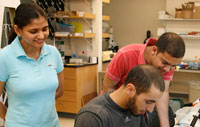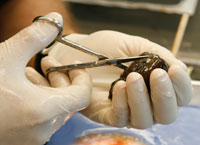 |

For further information, contact the MBL Communications Office at (508) 289-7423 or e-mail us at comm@mbl.edu
For Immediate Release: August 19, 2009
Contact: Diana Kenney, 508-289-7139; dkenney@mbl.edu
University of Massachusetts Dartmouth Scientists Receive Fellowship for Summer Research at the Marine Biological Laboratory
 |
 |
 |
Photos:
Click thumbnail for larger image:

From left, Swati Mishra, Skander Limem, and Animesh Agrawal, graduate students from the University of Massachusetts Dartmouth, are studying the physical properties of marine tissues at the MBL this summer through a Bell Fellowship. Photo by Elizabeth Armstrong.

Skander Limem investigates the tension and compression properties of the sea anemone muscle. Marine tissues may serve as models for the engineering of replacement human tissues, such as cartilage. Photo by Elizabeth Armstrong.
|
MBL, WOODS HOLE, MA—The Marine Biological Laboratory (MBL), an internationally recognized biomedical and environmental research and education center in Woods Hole, today announced that two professors from the University of Massachusetts Dartmouth have been awarded the institution’s Eugene and Millicent Bell Fund Fellowship.
Dr. Paul Calvert and Dr. Alex Fowler both received the Bell Fellowship, established by the MBL to enable scientists to research biomedical questions that expand the possibilities for tissue and organ regeneration and replacement.
Dr. Calvert, a professor in the Materials and Textiles Department, and Dr. Fowler, a professor of Mechanical Engineering, are working among some of the world’s leading cell biologists, physiologists, parasitologists, microbiologists, neurobiologists, developmental biologists, and ecologists, who convene at the MBL each summer in pursuit of scientific discovery and intellectual enrichment.
The fellows’ work is an important component of the MBL’s plan to establish a Program in Regenerative Biology and Medicine, a longtime goal of the institution that has received the strong support of the Massachusetts Life Sciences Center.
“Congratulations to Dr. Calvert, Dr. Fowler and their entire team at UMass Dartmouth on being awarded the Bell Fellowship,” said Dr. Susan Windham-Bannister, President & CEO of the Massachusetts Life Sciences Center. “Massachusetts is leading the way in the promising field of regenerative medicine, and the MBL is playing a very prominent role through their important research, and through their renovation of the Loeb Laboratory into a world-class regenerative medicine research facility.” The Center has committed a $10 million grant to fund the Loeb Laboratory renovations, matched by a $15 million grant from the Howard Hughes Medical Institute.
Specifically, Calvert and Fowler are working to identify strong hydrogels in marine tissues that may be used as models for the design of medical implants to replace soft-tissues such as cartilage or cornea. It may also be possible to use such strong gels in engineering for damping, lubrication, or in making more anthropomorphic robots. Calvert, Fowler, and their colleagues on the project are also surveying cell metabolism in non-vascular marine tissues to learn how to keep cells alive in engineered tissues without a blood supply. Other participating faculty members from UMass Dartmouth are Sankha Bhowmick, Vijaya Chalivendra, and Nima Rahbar. Graduate students Animesh Agrawal, Skander Limem, Swati Mishra and Nandula Wanasekara are also working at the MBL on the project this summer.
The Eugene and Millicent Bell Fellowship Fund in Tissue Engineering at the MBL was established to provide “a research award to visiting graduate students, postdoctoral fellows or faculty pursuing research in a variety of biomedical questions that advance our knowledge of biological composition and function at levels ranging from molecules to cells, to tissue, to organs and whole organisms. This work is grounded in a solid base of chemistry, physics, math and biology and aims to expand the possibilities for tissue and organ reconstitution and replacement.”
The MBL is a leading international, independent, nonprofit institution dedicated to discovery and to improving the human condition through creative research and education in the biological, biomedical and environmental sciences. Founded in 1888 as the Marine Biological Laboratory, the MBL is the oldest private marine laboratory in the Americas. For more information, visit www.MBL.edu.
|